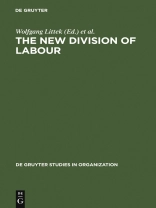Tabella dei contenuti
Frontmatter — Introduction — Part I. Basic Issues in the New Division of Labour — Introduction to Part 1 — Chapter 1: Trust as a Basis of Work Organisation — Chapter 2: Meta-Corporations and Open Labour Markets: Some Consequences of the Reintegration of Conception and Execution in a Volatile Economy — Chapter 3: New Production Concepts and the Restructuring of Work — Chapter 4: Gender and Technology: An Appraisal of the Labour Process Debate — Chapter 5: Globalisation, New Production Systems and the Spatial Division of Labour — Chapter 6: Continuities and Discontinuities in the Sociology of the Division of Labour — Part II. The New Division of Labour in Comparative Perspective — Introduction to Part II — Chapter 7: The New Division of Labour in Europe — Chapter 8: The Changing Face of Service Work in European Countries — Chapter 9: New Technologies and Post-Taylorist Regulation Models: Production Planning Systems in French, Italian, and German Enterprises — Chapter 10: The Social Foundations of Technical Innovation:Engineers in the Division of Labour in France and Japan — Chapter 11: Lean Production in Japan: Myth and Reality — Part III. Case Studies on the New Division of Labour — Introduction to Part III — Chapter 12: Taylorism Never Got Hold of Skilled White-Collar Work in Germany — Chapter 13: Innovation, Employment Systems and Division of Labour: An Analysis of the Canadian Banking Sector — Chapter 14: Office Work, Gender and Technological Change: The Portuguese Case — Chapter 15: The Division of Labour between Centre and Periphery in Industrial Networks: The Case of Galicia, Spain — Chapter 16: Frictions in the New Division of Labour: Cooperation between Producers and Suppliers in the German Automobile Industry — Chapter 17: Technological Change and Work Relations in the British Coal Mining Industry — Chapter 18: Job Redesign at Finnish Shipyards — Causes and Consequences — Notes on Contributors












